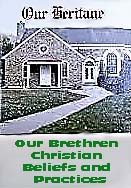OUR PRAYERS HELP BRING DELIVERANCE'S
"Ye also helping
together on our behalf by your supplication" 2 Cor. 1:11
This is pre-eminently
the comfort chapter of the New Testament. Writing to his children in Corinth
and Achaia, Paul was recalling a dark experience through which he had passed
in Asia, when he had in affliction come so near to death, that he had actually
died but for the deliverance of God. In all that time of suffering he had known
the comfort of God, and now knew that through such experiences of trial and of
comfort, he had been prepared to COMFORT OTHERS. The deliverance of the past
filled him with confidence about whatever the future might bring. He was
confident that He would still deliver him. It is at this point that the words
we have selected flash out upon us. Notice the surprising connection: "He will
also still deliver us; ye also helping together . . . by your supplication."
Our PRAYERS for our loved ones help God to work DELIVERANCE FOR THEM. That is a
deep MYSTERY, but it is a fact of which it is important for us to take heed. There are things which God can do only when
we pray. It was surely that conviction in the olden days which made Samuel
said as he retired from his judgeship to make way for Said, "Far be it
from me that I should sin against Jehovah in ceasing to pray for you."
(1 Sam. 12:23) Observe carefully
that he did not say that by ceasing to pray he would sin against them, but that
HE WOULD SIN AGAINST JEHOVAH. When we cease to pray, WE LIMIT GOD, and wrong
our friends. We may not understand this, but we ought to act upon it. By our SUPPLICATIONS,
we are helping together in the DELIVERANCE'S God works for our loved ones.




























